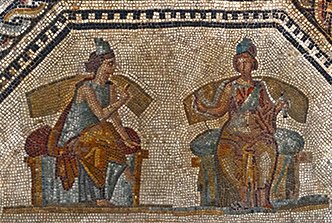
Seated women conversing, Roman mosaic

Cornelia (c. 190-115 BCE), daughter of Publius Cornelius Scipio Africanus, wife of Tiberius Sempronius Gracchus, and mother of the radical reformers Tiberius (d. 133 BCE) and Gaius (d. 121 BCE) Gracchus, became famous herself as the epitome of the virtuous Roman matrona (see Vnivirae). Born into an aristocratic consular family in the second century BCE, she bore her husband twelve children, only three of whom survived into adulthood (Tiberius, Gaius, and her daughter Sempronia (170-101 BCE), later wife of Scipio Aemilianus). Despite the great difference in their ages (she was 18, he was 48), her marriage was a loving, harmonious one, as Plutarch's anecdote reveals: upon finding a pair of snakes in his bed, her husband consulted an augur, who said that if Tiberius chose to kill the female snake, Cornelia would die, but if he killed the male snake, he would die. Judging it to be more fitting that he should die, being so much older than Cornelia, Tiberius killed the male snake and died soon after. Cornelia raised their children alone and ran the household so admirably, reports Plutarch, that the Egyptian king Ptolemy VI Philometer (181-146 BCE) proposed marriage to her, which she declined. Plutarch adds that it was generally agreed that the virtue of her three surviving children derived more from their mother's education of them than from any natural propensity on their part.
4.4.init. Maxima
ornamenta
esse
matronis liberos . . . . Cornelia Gracchorum mater,
cum
Campana
matrona,
apud
illam
hospita,
ornamenta sua pulcherrima illius
saeculi
ostenderet
traxit eam
sermone
donec e schola
redirent liberi, et
![]() “haec” inquit
“ornamenta sunt mea.”
“haec” inquit
“ornamenta sunt mea.”
Click on the underlined words for translation aids and commentary, which will appear in a small window. Click on the icon link![]() to the right of the text for related images and information.
to the right of the text for related images and information.